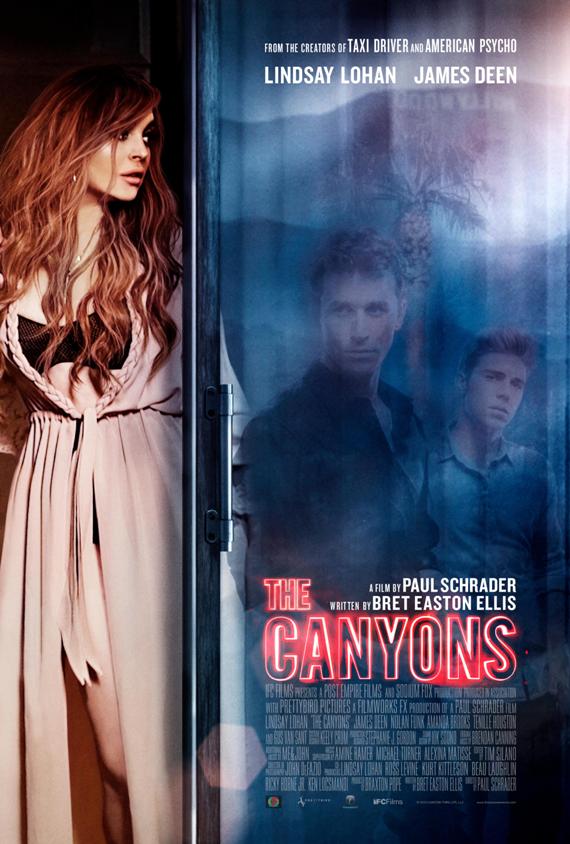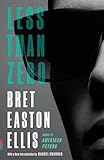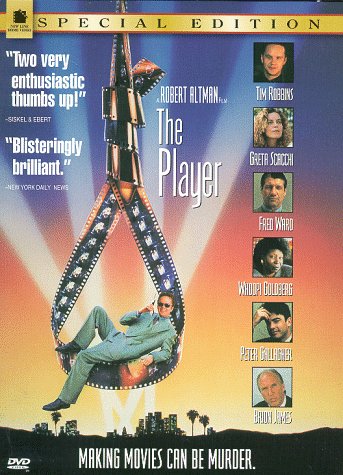
Bad movies, like all bad art, have an important job to do. Without them we wouldn’t be able to identify, appreciate, and differentiate the great, the good, and the merely passable. It’s not that bad is the new good. It’s that bad is vital and timeless because without it there could be no good.
And make no mistake about it, The Canyons, the new movie directed by Paul Schrader, written by Bret Easton Ellis, and starring Lindsay Lohan, is very bad. You sense this from the first frames when, to droning synthesizer moans, the credits play over washed-out still photos of abandoned movie theaters. Bummer! People have stopped going out to see movies!
 Says who? Says Paul Schrader. In an interview with the Tribeca Film Festival, the writer of some classic movies (Taxi Driver, Raging Bull) and the director of some pedigreed dogs (Hardcore, American Gigolo, Light Sleeper) explained that this credit sequence was his way of lamenting the fact that technology is killing the communal experience of going to a theater to sit in the dark with strangers and watch large pictures move on a screen. “The two-hour format is under siege,” Schrader said. “But the whole concept of visual entertainment is expanding… This myth that people will always want to go out to the movies, they’ll always want a communal experience – I don’t know that that’s necessarily true.”
Says who? Says Paul Schrader. In an interview with the Tribeca Film Festival, the writer of some classic movies (Taxi Driver, Raging Bull) and the director of some pedigreed dogs (Hardcore, American Gigolo, Light Sleeper) explained that this credit sequence was his way of lamenting the fact that technology is killing the communal experience of going to a theater to sit in the dark with strangers and watch large pictures move on a screen. “The two-hour format is under siege,” Schrader said. “But the whole concept of visual entertainment is expanding… This myth that people will always want to go out to the movies, they’ll always want a communal experience – I don’t know that that’s necessarily true.”
This sounds like those doomsayers who worried that television was going to kill the movies half a century ago, but whatever. The Canyons opens with a long, rudderless scene in a restaurant where we meet the main characters, a reptilian crew who are all involved in the making of some kind of B movie. The king lizard on this reptile farm is Christian, played by James Deen (get it?), a veteran of some 4,000 porn movies but a newcomer to a serious dramatic role. It shows. Deen has a hard time giving a convincing line reading, and yet after a while I started to see him as an inspired casting choice. Christian is a trust fund kid (he refers to his father as “The Asshole”) and he wears his sense of entitlement effortlessly and convincingly, on his face and in his body language, in his car and his clothes and his promiscuous sex life and, especially, in his preposterous house perched above the Pacific. He’s a character only Bret Easton Ellis could love.
His girlfriend is Tara (Lohan), who looks puffy and wears Kabuki eye makeup and sounds like she’s back on the Xanax. As a pampered party girl who doesn’t do much of anything but have sex, drink, and go to the gym, Lohan is another inspired casting choice. It’s impossible to separate her tabloid meltdowns from what’s on the screen here, and in an unsettling way, it works. Christian and Tara are celebrating the fact that Ryan (Nolan Gerard Funk), a pretty-boy hick just off the bus from Michigan, has won the lead role in Christian’s new movie, with a boost from Tara. Ryan’s girlfriend Gina (Amanda Brooks) is Christian’s assistant. Neither Christian nor Gina is aware that Ryan and Tara are having an affair. Welcome to the reptile farm.
Throughout this scene, Christian and Tara gaze into their smartphones as if they’ve been hypnotized by the things. Eventually we learn why: Christian likes to take videos of the hookups he and Tara make with a revolving cast of men and women. Who needs movie theaters when you can make porno in the comfort of your own home?

 And that’s pretty much what The Canyons is about. It seems to want to join the venerable company of movies about the making of movies, from Sunset Boulevard to Mulholland Drive, The Player, and Hugo. But there isn’t any actual movie-making in this movie. Instead, these people do drugs, they do lunch, they do each other. They drive around and walk through malls and shop. The sex scenes are graphic without being even slightly erotic, which could be the whole point. The dialogue is often dreadful (“Nobody has a private life anymore” and “Who’s really happy?” and this line of inspired sexual foreplay: “Get to work. Put it in your fucking mouth”). In the end it’s hard to care about any of these people, with the possible exception of Tara because Lohan, our distaff Charlie Sheen, brings a raspy vulnerability to the part. Again, that might be the whole point. After all, we’re deep in Bret Easton Ellis country, southern California zip code. Which means there will be sex and there will be blood and anything goes and nothing matters.
And that’s pretty much what The Canyons is about. It seems to want to join the venerable company of movies about the making of movies, from Sunset Boulevard to Mulholland Drive, The Player, and Hugo. But there isn’t any actual movie-making in this movie. Instead, these people do drugs, they do lunch, they do each other. They drive around and walk through malls and shop. The sex scenes are graphic without being even slightly erotic, which could be the whole point. The dialogue is often dreadful (“Nobody has a private life anymore” and “Who’s really happy?” and this line of inspired sexual foreplay: “Get to work. Put it in your fucking mouth”). In the end it’s hard to care about any of these people, with the possible exception of Tara because Lohan, our distaff Charlie Sheen, brings a raspy vulnerability to the part. Again, that might be the whole point. After all, we’re deep in Bret Easton Ellis country, southern California zip code. Which means there will be sex and there will be blood and anything goes and nothing matters.
Much has been written about how Schrader made this movie on the cheap after raising $170,000 on Kickstarter. His goal was to get out from under the thumb of studio suits. As someone who has written magazine articles that got carved up by committees of editors, I can appreciate Schrader’s yearning for creative control. But if this mess is what creative control produces, I say bring back the suits.
 On paper, the pairing of Schrader and Ellis looks like a natural. Both have had long, if uneven, careers working society’s margins, exploring the lives of misfits, the privileged, the kinky, the benumbed. I’ve long admired Ellis for having the courage to create mercilessly repellent characters, especially given today’s tyranny of likability. I think the anomie-soaked Less Than Zero is his best book. But he has given up novel writing in favor of screenwriting, a sensible career move given the way moving images continue to overwhelm and marginalize the writing of serious fiction in America. Based on what’s on the screen here, though, maybe he should consider returning to his fictional roots. I haven’t read The Canyons script, but I saw what’s on the screen. At one point Christian, who is about as deep as a mud puddle, offers this bit of gravitas: “We’re all just actors.” And when Tara takes control of a four-way sex scene, Christian moans to his shrink the next morning, “I felt objectified.” Everyone in the theater burst out laughing.
On paper, the pairing of Schrader and Ellis looks like a natural. Both have had long, if uneven, careers working society’s margins, exploring the lives of misfits, the privileged, the kinky, the benumbed. I’ve long admired Ellis for having the courage to create mercilessly repellent characters, especially given today’s tyranny of likability. I think the anomie-soaked Less Than Zero is his best book. But he has given up novel writing in favor of screenwriting, a sensible career move given the way moving images continue to overwhelm and marginalize the writing of serious fiction in America. Based on what’s on the screen here, though, maybe he should consider returning to his fictional roots. I haven’t read The Canyons script, but I saw what’s on the screen. At one point Christian, who is about as deep as a mud puddle, offers this bit of gravitas: “We’re all just actors.” And when Tara takes control of a four-way sex scene, Christian moans to his shrink the next morning, “I felt objectified.” Everyone in the theater burst out laughing.
Ellis was unhappy with the finished product. “The film is so languorous,” he told the New York Times. “It’s an hour 30, and it seems like it’s three hours long. I saw this as a pranky noirish thriller, but Schrader just turned it into, well, a Schrader film.”
Indeed he did. When this Schrader film’s final scene ended, everyone in the theater burst out laughing again. This was not amused or delighted laughter. It was derisive, and it indicates just how very bad this movie is, how far apart its intention is from its achieved effect. Which is why it is such an excellent misadventure, and very much worth seeing.











